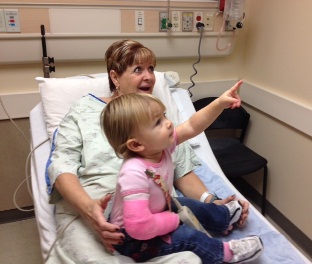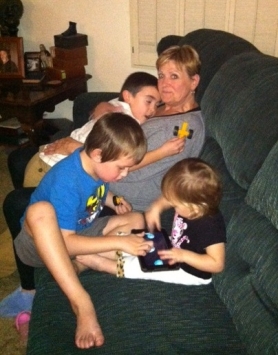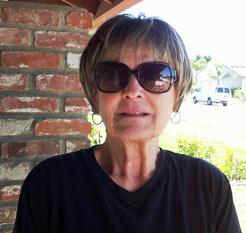Mesothelioma Patient Coping With A New Reality
Sometimes Arlene Delman still sees glimmers of her previous life when she least expects it. Like when a stranger pays her a compliment on her hairstyle at the grocery store which she adds, isn’t the first time, she can’t help but feel good. “I never got this much attention with my real hair,” she giggles. These moments of normalcy most resemble her old life before she was diagnosed with pleural mesothelioma in October 2012. Now she admits to shedding more than a few tears when she removes her wig at the end of the day. She has always been an attractive woman with big twinkling blue eyes, but her vanity has been rendered insignificant in the way she has tackled her treatment both aggressively and optimistically.
Prior to her diagnosis, Arlene had retired to lovely and quaint Grants Pass, Oregon. She and her late husband Ivan had settled there to be close to her son Roger and his family. Arlene had recently purchased a fixer-upper home in Grants Pass and had invested a lot in upgrades. When her respiratory symptoms from the summer before were not subsiding, she followed-up with her doctor who recommended a CT scan. The scan revealed a mass and Arlene was scheduled for a pleural biopsy in early October. She was shocked when the results came back positive for mesothelioma..

Grants Pass is far from any facility offering the specialized medical treatment she would require so Arlene wasted no time researching specialists before locating Dr. Robert Cameron, director of UCLA’s Comprehensive Mesothelioma Program. Arlene had grown up in the Los Angeles Valley and remained very close to a married couple she considered family. Arrangements were made for her stay with her good friends Tom and Sherree Jackson in Simi Valley which is about an hour north of UCLA
Arlene was relieved upon learning she was surgical candidate and underwent the pleurectomy/decortication (P/D) surgery with Dr. Cameron in early December. Unfortunately, the pathology slides taken from her surgery revealed her tumor was actually biphasic, meaning it was both epithelial and sarcomatoid cell-type, the latter of which is the much more aggressive cell-type. In Arlene’s case, she had a perfectly split distribution, 50% epithelial and 50% sarcomatoid. Both epithelial and sarcomatoid require distinct treatment protocols. This presents quite a challenge to treat an already difficult cancer with a particularly difficult presentation. In fact, Dr. Cameron told her he hadn’t seen a 50/50 patient since 1986.
After Arlene recovered from her surgery, instead of undergoing radiation treatment which is the typical multimodal treatment protocol for predominately epithelial mesothelioma, she underwent chemotherapy to address the sarcomatoid cell-type. She had her first round of Ifosfamide with Mesna and Doxorubicin in late January with oncologist Dr. Melissa Cohen at a UCLA satellite in Westlake. This is the type of chemo that caused Arlene’s hair loss but otherwise, she tolerated it quite well which is rare for this regimen.

After her second chemo round in February, a CT scan revealed a small tumor on Arlene’s aorta which most likely developed because it took her treatment plan eight weeks to develop and implement after her problematic P/D pathology results. In addition, her low white blood cell count was a constant issue and caused delays in order to be addressed before treatment could commence.
Arlene continued to stay with her good friends the Jacksons while receiving treatment in Los Angeles, give and take a few trips back to Oregon to wrap up her affairs. She put her home on the market so she could make the permanent move to Los Angeles close to her treatment. Her son Roger and wife Kathryn also put their home on the market so they could all go in on a house together and help take care of each other. Their wholehearted embrace of uprooting their own family including two elementary-school children to traffic-filed Los Angeles rendered Arlene tremendously grateful for their sacrifice.
By May 2013, Arlene had received four rounds of the Ifosfamide chemo regimen and was notified it did not work. An updated CT scan revealed two masses in her rib area and multiple spotting in the pleural space, in addition to the previously discovered aorta tumor. All the “starting and stopping” in her treatment is the likely culprit for why her tumor cells grew so quickly. Her physician team considered follow-up treatments including radiation, cryoablation and even surgery but they were ultimately all ruled out due to the precarious locations of her tumors. Throughout this time, Arlene had to deal with the frustration of her health insurance denying coverage for treatment they considered “experimental”. She felt so desperate she even begged to pay out-of-pocket until she discovered she didn’t qualify for the treatments anyway.

It’s now late August and Arlene’s last option is to undergo two very aggressive courses of Alimta Cisplatin chemotherapy. She started her first course last week and her final course is in September. She reports that this regimen, surprisingly unlike her Ifosfamide reaction, has been especially hard on her. She takes this as a sign that it’s working harder and that she’s “now on the right path.” She feels she needs this aggressive and proactive philosophy guiding her and essentially making up for lost time.
This journey has taken its toll on Arlene both physically and mentally. She continues to fight through every setback and obstacle with the love and support of her family and friends. The Jacksons have tended to her like a beloved member of their family. They have been to every single doctor’s appointment with her, taking notes and asking the doctors questions on her behalf. Arlene and her son Roger are currently in escrow and will soon happily all be under the same roof. Her daughter Donna and grandson also visit her every other week from Las Vegas.
Arlene may barely recognize her life since her diagnosis but she has coped and embraced her situation with the kind of grace and positivity that only someone with her strength could manage.
*** Posted on September 3, 2013 ***
An Update -- October 8, 2013
Arlene has updated us with very happy news indeed. In addition to finally settling into the comfortable home she bought with her son and daughter-in-law, the results of her recent CT scan were very promising. The results demonstrated that her new chemo regimen has effectively shrunk both her epithelial tumor cells and sarcomatoid tumor cells. She reports that Dr. Cameron is “ecstatic” with the results and Dr. Cohen is just “beside herself” with glee. Arlene continues to receive platelets on a regular basis, consult with a pain-management specialist and cardiologist in order to address ancillary conditions related to her mesothelioma.
Her unwavering positive attitude continues to make a huge difference in her condition. After reviewing her chart, new doctors usually expect to see a feeble sickly patient but are absolutely stunned when a bubbly woman practically bounces right into the exam room. Arlene also has a deep sense of responsibility regarding her role in the medical field. As Dr. Cameron previously notified her, she’s his first patient since 1986 who is purely 50/50 epithelial and sarcomatoid cell-type. Arlene believes her medical trajectory is contributing to the current body of mesothelioma research and may hopefully help someone in the future.
Given the good news, Arlene is taking advantage of this opportunity and has many things scheduled to look forward to. Her son has planned a weeklong surprise-destination trip coming up and she’s also looking forward to visiting her daughter in Las Vegas for the week of Thanksgiving. According to Arlene, she simply has too many things she still wants to do with her children and grandbabies to let her condition get her down.
* * * Arlene Delman passed away on June 15, 2014 * * *


